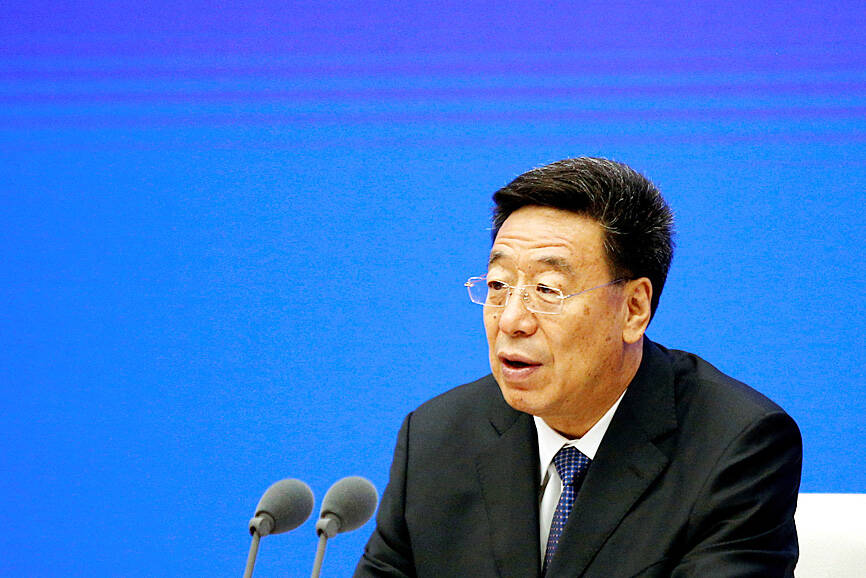The US on Friday imposed sanctions on two senior Chinese officials over “serious human rights abuse” in Tibet, including alleged torture and killings of prisoners and forced sterilization.
Washington blocked any US assets and criminalized transactions with Wu Yingjie (吳英杰), who was the Chinese Communist Party secretary of the Tibet Autonomous Region from 2016 to last year, and Zhang Hongbo (張洪波), China’s police chief in the Himalayan region since 2018, who is believed to still be in charge.
The sanctions announcement comes despite a relative easing of tensions between Washington and Beijing since US President Joe Biden and Chinese President Xi Jinping (習近平) met last month in Bali and agreed to step up dialogue.

Photo: Reuters
“Our actions further aim to disrupt and deter the People’s Republic of China’s arbitrary detention and physical abuse of members of religious minority groups in the Tibetan Autonomous Region,” US Secretary of State Antony Blinken said in a statement.
Wu directed a policy of “stability” in Tibet that included “serious human rights abuse, including extrajudicial killings, physical abuse, arbitrary arrests and mass detentions,” the US Department of the Treasury said in a statement.
“Additional abuses during Wu’s tenure include forced sterilization, coerced abortion, restrictions on religious and political freedoms and the torture of prisoners,” it said.
Zhang has engaged in abuses, including the torture and killing of prisoners, by running detention centers across Tibet, the department said.
China has ruled the predominantly Buddhist region since 1951. The region’s spiritual leader, the Dalai Lama, fled in 1959 to India amid an abortive uprising.
As part of a slew of sanctions on Friday, the US also targeted North Korea’s border guards over their shoot-on-sight orders against citizens fleeing into China and Russia.

‘EYE FOR AN EYE’: Two of the men were shot by a male relative of the victims, whose families turned down the opportunity to offer them amnesty, the Supreme Court said Four men were yesterday publicly executed in Afghanistan, the Supreme Court said, the highest number of executions to be carried out in one day since the Taliban’s return to power. The executions in three separate provinces brought to 10 the number of men publicly put to death since 2021, according to an Agence France-Presse tally. Public executions were common during the Taliban’s first rule from 1996 to 2001, with most of them carried out publicly in sports stadiums. Two men were shot around six or seven times by a male relative of the victims in front of spectators in Qala-i-Naw, the center

Incumbent Ecuadoran President Daniel Noboa on Sunday claimed a runaway victory in the nation’s presidential election, after voters endorsed the young leader’s “iron fist” approach to rampant cartel violence. With more than 90 percent of the votes counted, the National Election Council said Noboa had an unassailable 12-point lead over his leftist rival Luisa Gonzalez. Official results showed Noboa with 56 percent of the vote, against Gonzalez’s 44 percent — a far bigger winning margin than expected after a virtual tie in the first round. Speaking to jubilant supporters in his hometown of Olon, the 37-year-old president claimed a “historic victory.” “A huge hug

Canadian Prime Minister Mark Carney is leaning into his banking background as his country fights a trade war with the US, but his financial ties have also made him a target for conspiracy theories. Incorporating tropes familiar to followers of the far-right QAnon movement, conspiratorial social media posts about the Liberal leader have surged ahead of the country’s April 28 election. Posts range from false claims he recited a “satanic chant” at a campaign event to artificial intelligence (AI)-generated images of him in a pool with convicted sex offender Jeffrey Epstein. “He’s the ideal person to be targeted here, for sure, due to

DISPUTE: Beijing seeks global support against Trump’s tariffs, but many governments remain hesitant to align, including India, ASEAN countries and Australia China is reaching out to other nations as the US layers on more tariffs, in what appears to be an attempt by Beijing to form a united front to compel Washington to retreat. Days into the effort, it is meeting only partial success from countries unwilling to ally with the main target of US President Donald Trump’s trade war. Facing the cratering of global markets, Trump on Wednesday backed off his tariffs on most nations for 90 days, saying countries were lining up to negotiate more favorable conditions. China has refused to seek talks, saying the US was insincere and that it